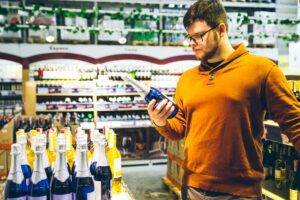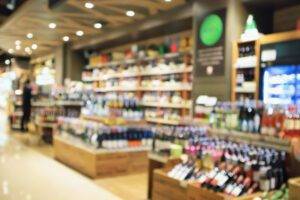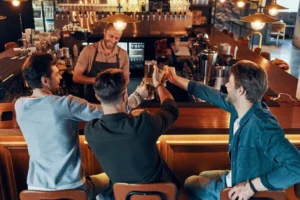The retail landscape is rapidly transforming, and liquor stores are no exception. Technology is reshaping how these businesses operate, offering new opportunities to enhance customer experiences and streamline operations. With the increasing demand for convenience and efficiency, integrating technology into point-of-sale systems is crucial for liquor stores to remain competitive and meet modern consumer expectations.

Liquor store owners must embrace technology trends to optimize their point-of-sale systems. By doing so, they can provide faster service, improve inventory management, and gain valuable insights into consumer behavior. As technology continues to evolve, it presents exciting possibilities for innovation within the industry. Those who adapt quickly will not only enhance their operational efficiency but also create a more engaging shopping experience for their customers. Dive into this article to discover the tech trends that are shaping the future of liquor stores and learn how to leverage them for success.
The Rise of Mobile Payments
The integration of mobile payments into point of sale systems is revolutionizing the retail experience for liquor stores. Consumers increasingly seek convenience, and mobile payments offer a seamless way to complete transactions. With just a tap on their smartphones, customers can swiftly pay for their purchases, reducing wait times and enhancing overall store efficiency. This speed not only improves customer satisfaction but also enables stores to handle more transactions in less time, potentially increasing sales volume.
Security is a critical concern for both consumers and business owners when it comes to payments. Mobile payment systems address these concerns by employing robust security features such as tokenization and encryption. These technologies protect sensitive card information during transactions, reducing the risk of fraud and providing peace of mind for users. By integrating secure mobile payment options, liquor stores can reassure their customers that their financial information is safe, thus fostering trust and encouraging repeat business.
Several mobile payment options have become popular among liquor stores due to their reliability and ease of use. Apple Pay, Google Wallet, and Samsung Pay are widely adopted platforms that support contactless payments with the added benefit of loyalty program integration. Liquor store owners can leverage these platforms to enhance customer experiences while streamlining operations. Implementing these mobile payment solutions positions liquor stores at the forefront of retail technology trends, ensuring they meet consumer demands for modern, efficient shopping experiences.
Integrated Loyalty Programs
Integrated loyalty programs are transforming how liquor stores engage with their customers, offering a powerful tool for enhancing customer retention. By rewarding repeat purchases, these programs create a sense of value and appreciation, encouraging customers to return. For example, a liquor store can offer points for every dollar spent, which can be redeemed for discounts or exclusive products. This not only incentivizes repeat business but also fosters a strong customer relationship, as consumers feel recognized and valued.
Loyalty programs also serve as a rich source of data collection, providing insights into customer preferences and buying habits. By analyzing this data, store owners can tailor marketing strategies and product offerings to better meet the needs of their clientele. For instance, if data shows a preference for certain wine brands or spirits, store owners can adjust inventory and promotions accordingly. This targeted approach not only improves sales but also enhances the shopping experience by aligning it more closely with customer desires.
Several liquor stores have successfully implemented integrated loyalty programs, setting benchmarks in the industry. A notable example is BevMo!, a large beverage retailer that offers a membership program providing exclusive discounts and early access to sales. Such programs not only drive sales but also build a loyal customer base that is more likely to choose the store over competitors. As these examples show, integrating loyalty programs into business operations can significantly impact both customer satisfaction and overall profitability in the liquor industry.
Contactless Payment Solutions
The demand for contactless payment solutions is on the rise, driven by consumer preferences for speed and safety in retail transactions. For liquor store owners, integrating these systems can significantly enhance the shopping experience. Customers appreciate the ability to quickly and securely complete their purchases with a simple tap of their card or smartphone. This retail innovation not only streamlines the checkout process but also aligns with the increasing consumer expectation for modern and efficient point of sale systems in liquor stores.
The benefits of contactless payments extend beyond convenience. For customers, it means reduced waiting times and minimized physical interaction, which is particularly appealing in today’s health-conscious environment. For store owners, implementing contactless payments can lead to increased customer satisfaction and loyalty. Additionally, it reduces the handling of cash, lowering the risk of theft and errors in cash management. The ability to process transactions swiftly allows staff to focus more on customer service and other critical areas of store operations.
Implementing contactless payment systems requires careful planning and execution. Store owners should start by evaluating their existing point of sale infrastructure to ensure compatibility with contactless technology. Partnering with reliable payment service providers can facilitate a smooth transition. Training staff on the new system is crucial to avoid disruptions and ensure a seamless customer experience. Store owners should also consider promoting the availability of contactless options through in-store signage and digital marketing campaigns to inform customers about this convenient feature.
Inventory Management Technology
Liquor store owners can significantly enhance their operations by adopting advanced inventory management technology. This software streamlines stock management, allowing for efficient tracking and organization of inventory levels. By automating these processes, store owners reduce the likelihood of human error and ensure that stock is consistently replenished to meet consumer demand. Advanced systems provide features such as automatic reordering and detailed reporting, which can save time and resources while enhancing the overall customer experience.
Real-time inventory tracking is a critical component in reducing losses and preventing stockouts or overstocking. By leveraging technology that offers instant visibility into stock levels, liquor stores can maintain optimal inventory balance. This real-time data allows for quick adjustments and informed decision-making, ensuring that popular products are always available to customers. Additionally, real-time tracking can alert store managers to discrepancies, helping to prevent theft or accounting errors that could lead to financial losses.
Moreover, inventory management technology can predict trends and optimize orders, giving liquor stores a competitive edge. By analyzing historical sales data and market trends, these systems forecast future demand with precision. This capability enables store owners to anticipate customer needs, adjust their inventory accordingly, and capitalize on emerging trends. Predictive analytics not only improves stock management but also enhances the customer experience by ensuring that sought-after products are readily available, thereby driving customer satisfaction and loyalty.
E-commerce Integration
Expanding reach through online sales platforms has become crucial for liquor stores aiming to stay competitive in today’s market. With the rise of digital shopping, consumers increasingly expect the convenience of ordering their favorite beverages from the comfort of their homes. By integrating e-commerce solutions, liquor stores can tap into a broader customer base beyond their immediate geographic location. This not only increases potential sales but also enhances brand visibility. Effective integration with existing point of sale liquor store systems ensures seamless inventory management and order processing, minimizing disruptions.
The importance of user-friendly websites and apps cannot be overstated in this digital age. A streamlined online shopping experience encourages customers to explore product offerings and complete purchases effortlessly. Features such as intuitive navigation, detailed product descriptions, and customer reviews play a significant role in engaging users. Additionally, mobile compatibility is vital, as a significant portion of online shopping occurs on smartphones and tablets. By ensuring that digital platforms are optimized for various devices, liquor stores can provide a consistent and satisfying user experience.
However, legal considerations for selling alcohol online must be carefully addressed. Liquor store owners need to navigate a complex web of regulations that vary significantly across states and countries. Compliance with age verification laws is paramount to prevent underage sales and avoid legal repercussions. Implementing robust verification processes within e-commerce platforms helps ensure that transactions meet legal requirements. Additionally, understanding shipping restrictions and taxes associated with alcohol sales is essential to avoid potential pitfalls. Collaborating with legal experts or consultants familiar with alcohol distribution laws can assist liquor store owners in maintaining compliance while expanding their online presence.
Data Analytics and Customer Insights
Liquor store owners can greatly benefit from the integration of data analytics to better understand consumer behavior. By analyzing digital transactions, store managers can track purchasing patterns, identify peak shopping times, and recognize which products are most popular among their customers. This information is invaluable for tailoring inventory to meet demand and for creating targeted promotions that resonate with specific customer segments. For example, a liquor store might discover through data analysis that craft beer sales surge during local sports events. This insight allows them to stock up accordingly and create special promotions to capture more sales during these periods.
Personalizing marketing strategies based on customer data is another significant advantage of utilizing data analytics. By segmenting customers according to their buying habits and preferences, liquor stores can send personalized offers and recommendations directly to their patrons. This targeted approach not only increases the likelihood of repeat purchases but also enhances the overall customer experience. A practical application of this could involve sending a personalized discount on a customer’s favorite brand of whiskey through a loyalty app, encouraging them to visit the store more frequently.
To leverage data effectively, liquor store owners should invest in robust tools and software designed for retail analytics. Solutions like POS systems with integrated analytics capabilities or specialized platforms like Nielsen’s Beverage Alcohol Practice can provide detailed insights into sales performance and customer demographics. Additionally, customer relationship management (CRM) software can help manage and analyze interactions with potential and current customers, enabling store owners to optimize their marketing efforts. By adopting these technologies, liquor stores can turn raw data from digital transactions into actionable insights that drive business growth and enhance customer satisfaction.
The Role of Augmented Reality (AR)
Augmented Reality (AR) is revolutionizing the retail experience by merging the digital and physical worlds. For liquor stores, AR offers an innovative way to enhance customer engagement and improve sales. By using AR applications, customers can visualize products in their real environment before purchase. This technology allows users to scan labels for detailed product information, pairing suggestions, or even virtual tastings. AR not only provides a unique shopping experience but also increases the likelihood of purchase by offering interactive content that educates and entertains.
Several industries have already successfully implemented AR solutions, providing a blueprint for liquor stores. For example, cosmetic retailers offer virtual try-ons, and furniture stores allow customers to visualize products in their homes. Liquor stores can apply similar strategies by enabling customers to see how different bottles would look on their shelves or providing virtual tours of vineyards and distilleries. This interactive element can be integrated into existing point of sale systems, creating a seamless and immersive shopping experience that captivates and retains customers.
The future possibilities for AR in liquor stores are vast. With ongoing advancements in technology, AR could soon facilitate personalized recommendations based on inventory management data and past purchase behavior. Customers might use AR to explore curated collections tailored to their preferences or discover new products matching their taste profiles. Additionally, as sustainability becomes increasingly important, AR can educate consumers on eco-friendly practices, such as recycling options or the environmental impact of different packaging materials. By embracing AR technology, liquor stores can not only enhance the shopping experience but also build a forward-thinking brand that appeals to tech-savvy and environmentally conscious consumers alike.
Sustainability and Technology
Eco-friendly practices in point of sale systems are becoming increasingly important as consumers demand more sustainable options. Liquor stores can implement digital receipts instead of paper ones, reducing paper waste significantly. Additionally, investing in energy-efficient POS hardware can lower the store’s carbon footprint. These changes not only appeal to environmentally-conscious consumers but also result in cost savings over time. By adopting these technologies, liquor stores demonstrate a commitment to sustainability that resonates with today’s consumer behavior.

Consumers are showing a clear preference for sustainable brands and products. This trend is evident in the growing market for organic wines and spirits that emphasize eco-friendly production methods. Liquor store owners should consider stocking such products and highlighting their environmental benefits to attract this segment of consumers. By aligning product offerings with consumer values, stores can enhance their brand image and foster customer loyalty. Integrating technology like QR codes on product labels can also provide instant information about a product’s sustainability credentials.
Technology can play a pivotal role in promoting sustainability within liquor stores. Smart inventory systems can help reduce waste by optimizing stock levels and minimizing overstock situations that lead to spoilage. These systems analyze sales data and predict future trends, allowing for more accurate ordering. Furthermore, implementing an online platform for direct-to-consumer sales can cut down on transportation emissions by optimizing delivery routes. By leveraging these technologies, liquor stores not only contribute to environmental conservation but also adapt to evolving consumer behavior that favors sustainable practices.
Embracing Technological Advancements for Future Success
Liquor stores must adapt to the rapidly evolving retail landscape by embracing key technological trends. Mobile payments and contactless solutions streamline transactions, offering speed and security. Integrated loyalty programs enhance customer retention while providing valuable insights through data collection. Inventory management technology reduces losses and optimizes orders with real-time tracking. E-commerce integration and augmented reality enrich the customer experience, expanding reach and engagement. Lastly, eco-friendly practices in point-of-sale systems align with consumer preferences for sustainability.
Adopting these technologies is essential for liquor store owners aiming to thrive in the future. By implementing these advancements, businesses can improve efficiency, enhance customer satisfaction, and drive growth. Stay competitive by integrating these tech trends into your operations, ensuring your liquor store remains at the forefront of the industry.
Working with United Banc Card of TN
If you find yourself wanting to conquer your restaurant, retail shop, look no further than United Banc Card of TN. With their innovative solutions and trusted POS System services, they will guide you towards financial success. Whether you are a small business owner or an individual looking to manage your finances better, United Banc Card of TN has the tools and expertise to help. Call us today @615-476-0255


